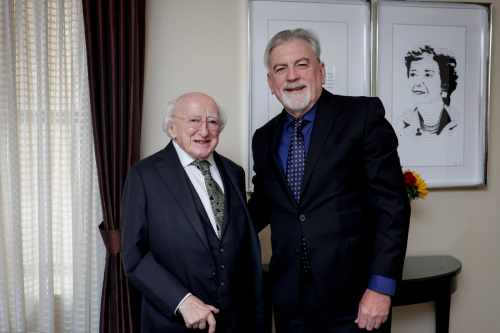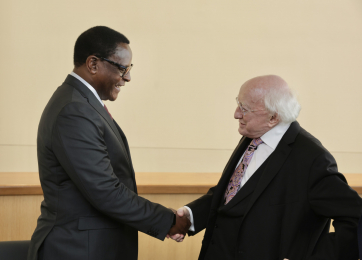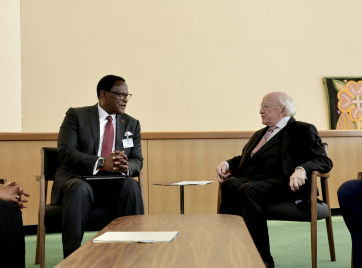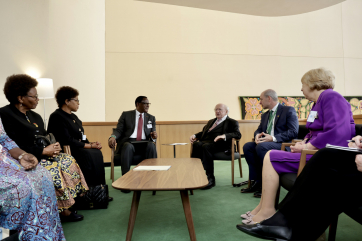Speech Receiving the Eugene O’Neill International Public Service Award
Irish Arts Centre, New York, 23rd September, 2024
A cháirde,
Mo bhuíochas libh uilig as an fíorchaoin fáilte a d’fhear sibh liom féin ‘s mo bheanchéile Saidhbhín. Is onóir dom glacadh le gradam atá ainmnithe i gcuimhne Eugene O’Neill.
As President of Ireland, may I say how pleased Sabina and I are to be here in New York again and how we appreciate your warm welcome this evening. May I thank Brendan Costello and Aidan Connolly for their kind words.
I offer my warm congratulations to them and to the entire team who have worked to achieve the vision that is the Irish Arts Centre today. In so doing, we honour also all those who worked in and supported the original Arts Centre since 1972 and whose legacy lives on today. It is of course a special pleasure to be joined here by Martin Hayes. Let me acknowledge also those artists present and recognise so many dedicated leaders and representatives of our Irish and Irish American community across New York.
I am in New York to attend the Summit of the Future at the United Nations. I addressed that Summit meeting yesterday, stressing how we need a truly representative United Nations that can respond to our interactive crises in global poverty, hunger – indeed in the interacting crisis in social justice, economy and ecology. World leaders are attempting to resuscitate the UN, and in particular its 2030 Agenda. I use the term “resuscitate” deliberately as, sadly, we are so far off the achievement of the Sustainable Development Goals which are a key outcome of this global compact agreed in 2015 and which represented such a beacon of hope, suggested a shared blueprint for peace and prosperity, the ending of global hunger and poverty.
Tomorrow morning, Heads of State and Government will gather for the opening of the General Assembly. Regrettably, we do so at a time, of threatening multiple conflicts, of enormous challenge regarding food security and at a time when our planet’s climate is in peril.
Children are dying on the news-screens of the world. We think especially of the distressing, continuing scenes from Gaza, as we approach the first anniversary of the dreadful events of October 7th and what has flowed from the response to those events. These are difficult and painful issues, but it is critical that we address them clearly and openly and I know that the moral significance of these issues must weigh heavily on your minds also.
The agreement of the Sustainable Development Goals represented a moment of rare global consensus about the urgent need to craft new models of human development, and security, founded on ethics and critical thinking, and centering on human rights and dignity, that implored us to ‘think long’, and bear in mind the needs not only of those who currently dwell on this planet, but also those yet to come.
It must be all of our hope that by coming together this week, Heads of State and Government will commit to new measures that will bolster our collective efforts to guarantee that the Sustainable Development Goals are achieved by 2030. An enhanced effort is necessary if we are to recover any semblance of such authenticity of actions and words we so need to recover trust with our publics, if we are to play our part in the recovery of such an inclusive global multilateral discourse as might deliver peace, sustainability and confront so many of what are our shared challenges for present and future generations.
The domination in the media discourse of the politics of fear and by the definition of power as capacity to access weapons of destruction is another indication of the crisis we currently face and is an issue that crosses generations.
The task we have been given, as Heads of State and Government, by the United Nations Secretary-General is to bring into being a United Nations and related institutions that will lead us through what are undeniable interacting crises – political, social, economic and, most importantly, ecological. It requires that what we say must have such authenticity as will enable and facilitate trust. We must agree collectively the meaningful steps, using all of the tools available to us, using them perhaps in a new way including notably anthropology – used in a new way, used by citizens to empower and to give them agency - indeed, all of the tools of the social science and the arts are vital to achieve what is a new literacy that can inform and make policies accountable. I have called this ‘a new globalisation from Below’.
As I reflected on this honour you offer me tonight, and on the work of Eugene O’Neill, I thought not only of the rich body of his work and our shared pride in his Irish heritage. I thought also of the themes of that work, facing many facets of the human condition, yielding at times to real despair. I think especially of his unique accomplishment in the publication of a Long Day’s Journey into Night, premiered in Stockholm.
Here we find not only the extraordinary complexity and sometime darkness of his text, but also a stark ability to face and interrogate many of the difficult themes of that play and of life itself. It is relevant, therefore, to acknowledge his own – unflinching and so often failing – attempts at authenticity as we consider our responsibilities as global leaders, as stewards of this planet and as citizens.
I spoke of the Irishness in Eugene O’Neill’s work when the Eugene O’Neill Society took the significant decision to hold its first meeting outside the United States in Clifden, County Galway. May I pay tribute to Professor Nelson Ó Ceallaigh Ritschel and his colleagues for that initiative, offering such a valuable opportunity to reflect upon the impact of O’Neill’s Irish psyche on his dramatic work. We are so pleased to see Nelson with us tonight.
Eugene O’Neill belongs to both the literary canons of America and Ireland, his themes not only reflective of the great motifs of both Irish and American theatre: but in particular, migration, the transitory nature of the migrant experience, and the uses and abuses of memory involved in its recall.
Recognition of the migrant experience has been a failure of the social sciences, less so in literature and in its recognition of the violence that emanates from the intimacies and intricacies of migrant experience, is central to an understanding of O’Neill.
That sense of vulnerability that is involved in balancing necessary myths of the past all with life as lived is so well depicted by Eugene O’Neill, has a deep source, one that flows, I believe, from the migratory experience of families such as that of O’Neill’s. In his work it is allied to a clear empathy with those without power, often on the margins of society.
The response to the transience that is at the heart of such migratory experience requires choice and often contest between stabilising versions of myth, and the use and abuse of memory is drawn onto constructs that must always be tentative, vulnerable, rarely healing.
The contest for which versions of a constructed version of communal memory to be invoked as material, not just for art, but for life, is central to O’Neill, as it was to his father, and as it would be to his children.
I have suggested that part of the legacy of Eugene O’Neill to theatre, not only in the United States but in the world, has been the new ground he carved out for the use of memory, as the stuff of transactional conscience, as not being ever simply an invocation of anything shared for the purposes of establishing a setting, but also in the dialogue as a scalpel in proximate interactions, an instrument that in different forms of delivery could become available for the psychic destruction of a protagonist.
O’Neill’s influence is deep and widespread, as Declan Kiberd has noted. Long Day’s Journey Into Night has had a palpable influence on subsequent Irish plays by artists as diverse as Tom Murphy (A Whistle in the Dark) and Brian Friel (Faith Healer). Its obsession with fog and foghorns is a leitmotif through Behan's The Quare Fellow, inspiring too, as it did, Nuala Ní Dhomhnaill’s poetic sequence The Fifty-Minute Mermaid.
As well as the vulnerable, the voices of the excluded are heard, voices ‘from below’, from settings where there is an intensity of experience, of sensual excess, of what is ephemeral, but yet, for all that, deeply and profoundly human, many in the best tradition of Chekov.
O’Neill was quoted as having said before his death in a conversation with his son, Eugene Jr.:
“The one thing that explains more than anything about me is the fact that I’m Irish”.
This recalled an early wish to be among the Irish writers – Shaw, O’Casey and Wilde.
The migrant sensibility is such a valuable sensibility. O’Neill understood this, writing about his family’s adopted home, the United States, as he had found it, not as it wished to be found, thus inspiring countless members of subsequent generations of Irish-Americans to do the same, some of whom are indeed present this evening, having drawn on that deep, rich well of migratory experience just as O’Neill did through his acclaimed artistry.
A life without the contribution of artists, of limited public opportunities for sharing cultural experiences, of being lifted to transcendence by performance in the many forms of the arts – such a life would be a much diminished existence, indeed I believe it would constitute a far from fulfilling encounter with life.
When we support artists, or when we call for protection of the cultural space as having a necessary public access, we support viable and enriching democracy, understanding that the arts are a crucial vehicle for active citizen participation. It is never acceptable, therefore, that it be treated as something peripheral and even dispensable.
Many artists have been allowed to sink into poverty and related ill-health. Others still have been forced to choose between having a family and giving expression to their gift, or have been forced to reflect on what it is to flourish without material security.
However, the arts are so much more than “eventing”. Yes, certainly they constitute a tool of tourism or commerce, but we must never forget that the arts have their own integrity and independence and must be respected as such, recognising this as a fundamental for policy makers. Let us assert and reassert these pure values, and communicate these to those in power and influence.
Irish America, evolved over several migrations and through its artistic community, has been essential to the preservation of our language, music and literature, and to our grasp of our own history.
In particular, our understanding of post-famine Ireland, the late nineteenth century, and the connection between Ireland and the United States, owes so much to Irish-American artistic and cultural practitioners and those who pioneered Irish studies and scholarship.
I am glad therefore that this Centre not only celebrates some of our most distinguished artists, but is programming new, exciting and contemporary works created in Ireland today, such as the Irish Dance Company, visual artists like Alice Maher and Rachel Fallon whose striking Map is presented here, Muldoon’s Picnic, masterclasses in the Uileann Pipes, Harp and Fiddle and much more.
This evening is an evening to celebrate – yes, we celebrate this inviting new space for the arts in New York, but we celebrate too the power and transcendence of the arts and culture in all our lives, the emancipatory potential the arts hold and can offer us all as we search for an alternative to war and conflict, to the largely unquestioned hegemonic paradigm under which we live that has proven so socially and ecologically ruinous, so that we may gain a new resonance with each other, with nature, indeed with all those whom we inhabit our shared, vulnerable planet in peril.
Mar fhocal scoir, may I wish all of you well, and may this building in which we stand become a vital setting in which to celebrate the work from both established and emerging artists and cultural practitioners, providing audiences with emotionally and intellectually engaging experiences in an environment of Irish hospitality. This dream of developing the Irish Arts Centre into a more modern facility became a reality which is now launched proudly to the world.
I thank you again for this, the Eugene O’Neill International Public Service Award, which I am so very glad to accept.
Míle buíochas is beir beannacht




